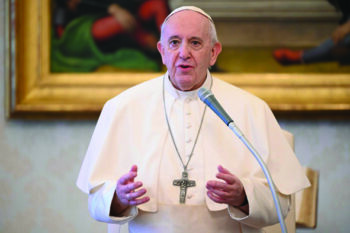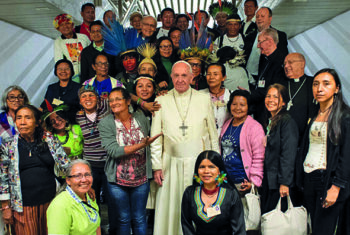Caring for one another in order to heal the world
 The pandemic has highlighted how vulnerable and interconnected everyone is. If we do not take care of one another, starting with the least, with those who are most impacted, including creation, we cannot heal the world.
The pandemic has highlighted how vulnerable and interconnected everyone is. If we do not take care of one another, starting with the least, with those who are most impacted, including creation, we cannot heal the world.
Coronavirus not the only disease
The effort of so many people who have been offering evidence of human and Christian love for neighbour, dedicating themselves to the sick even at the risk of their own health, is commendable. They are heroes! However, the coronavirus is not the only disease to be fought, but rather, the pandemic has shed light on broader social ills. One of these is a distorted view of the person, a perspective that ignores the dignity of the person. At times we look at others as objects, to be used and discarded. This type of perspective blinds, fostering an individualistic and aggressive throw-away culture, which transforms the human being into a consumer good.
In the light of faith we know, instead, that God looks at a man and a woman in another manner. He created us not as objects but as people loved and capable of loving. He created us in his image and likeness (see Genesis 1:27). In this way he has given us a unique dignity, calling us to live in communion with him, in communion with our sisters and our brothers, with respect for all creation. In communion, in harmony, we might say. Creation is the harmony in which we are called to live.
Giving one’s life for others
We have an example of that individualistic perspective, that which is not harmony, in the Gospels, in the request made to Jesus by the mother of the disciples James and John (see Matthew 20:20-38). She wanted her sons to sit at the right and the left of the new king. But Jesus proposes another type of vision -- that of service and of giving one’s life for others. Seeking to climb in life, to be superior to others, destroys harmony. It is the logic of dominion, of dominating others. Harmony is something else: it is service.
Therefore, let us ask the Lord to give us eyes attentive to our brothers and sisters, especially those who are suffering. As Jesus’s disciples we do not want to be indifferent or individualistic. These are the two unpleasant attitudes that run counter to harmony. Indifferent: I look the other way. Individualist: looking out only for my own interest. The harmony created by God asks that we look at others, the needs of others, the problems of others, in communion.
While we all work for a cure for a virus that strikes everyone without distinction, faith exhorts us to commit ourselves seriously and actively to combat indifference in the face of violations of human dignity.
Act with compassion and respect
This culture of indifference that accompanies the throwaway culture: things that do not affect me, do not interest me. Faith always requires that we let ourselves be healed and converted from our individualism, whether personal or collective.
May the Lord “restore our sight” so as to rediscover what it means to be members of the human family. And may this sight be translated into concrete actions of compassion and respect for every person, and of care and safeguarding of our common home.
Source: Zenit, General Audience,
12 August 2020
The Lord can heal us
We must each bring our own sad stories before the Lord. “Lord, if you will it, you can heal me!”, said the Canaanite woman (Matthew 15:21-28). This is what this woman teaches us, this wonderful mother: the courage to bring our own painful story before God, before Jesus, to touch God’s tenderness.
Let us go to Jesus, knock on Jesus’s heart and say to Him: “Lord, if You will it, you can heal me!” His is a heart that loves us as we are, without make-up.
May the Virgin Mary intercede with her prayer so that the joy of faith might grow in every baptised person as well as the desire to communicate it through a consistent witness of life, that she gives us the courage to approach Jesus and to say to him, “Lord, if you will it, you can heal me!”
Source: Zenit, Angelus Address, 16 August 2020

 Entries(RSS)
Entries(RSS)